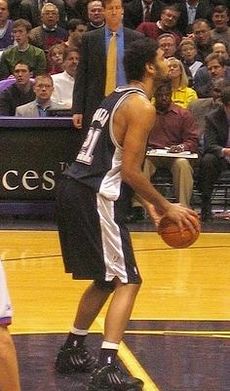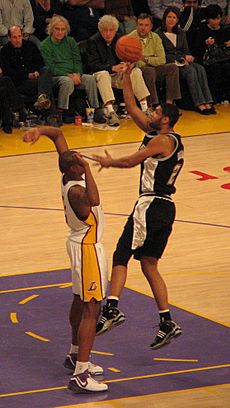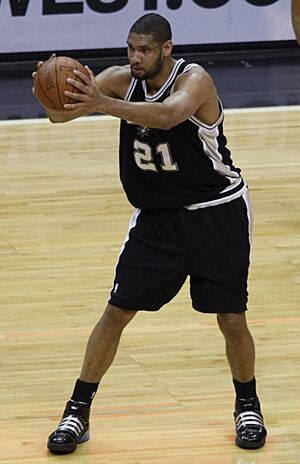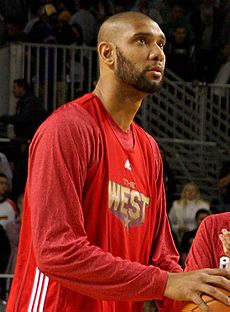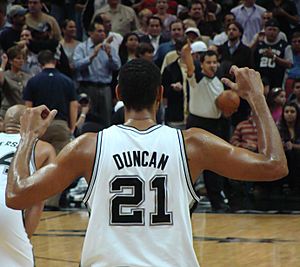Tim Duncan facts for kids
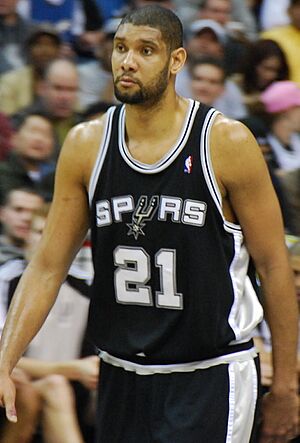
Duncan with the San Antonio Spurs in 2009
|
|||||||||||||||||||||||||||||||||||
| Personal information | |||||||||||||||||||||||||||||||||||
|---|---|---|---|---|---|---|---|---|---|---|---|---|---|---|---|---|---|---|---|---|---|---|---|---|---|---|---|---|---|---|---|---|---|---|---|
| Born | April 25, 1976 Saint Croix, U.S. Virgin Islands |
||||||||||||||||||||||||||||||||||
| High school | St. Dunstan's Episcopal (Saint Croix, U.S. Virgin Islands) |
||||||||||||||||||||||||||||||||||
| Listed height | 6 ft 11 in (2.11 m) | ||||||||||||||||||||||||||||||||||
| Listed weight | 250 lb (113 kg) | ||||||||||||||||||||||||||||||||||
| Career information | |||||||||||||||||||||||||||||||||||
| College | Wake Forest (1993–1997) | ||||||||||||||||||||||||||||||||||
| NBA Draft | 1997 / Round: 1 / Pick: 1st overall | ||||||||||||||||||||||||||||||||||
| Selected by the San Antonio Spurs | |||||||||||||||||||||||||||||||||||
| Pro career | 1997–2016 | ||||||||||||||||||||||||||||||||||
| Coaching career | 2019–2020 | ||||||||||||||||||||||||||||||||||
| Career history | |||||||||||||||||||||||||||||||||||
| As player: | |||||||||||||||||||||||||||||||||||
| 1997–2016 | San Antonio Spurs | ||||||||||||||||||||||||||||||||||
| As coach: | |||||||||||||||||||||||||||||||||||
| 2019–2020 | San Antonio Spurs (assistant) | ||||||||||||||||||||||||||||||||||
| Career highlights and awards | |||||||||||||||||||||||||||||||||||
|
|||||||||||||||||||||||||||||||||||
| Career statistics | |||||||||||||||||||||||||||||||||||
| Points | 26,496 (19.0 ppg) | ||||||||||||||||||||||||||||||||||
| Rebounds | 15,091 (10.8 rpg) | ||||||||||||||||||||||||||||||||||
| Blocks | 3,020 (2.2 bpg) | ||||||||||||||||||||||||||||||||||
|
Medals
|
|||||||||||||||||||||||||||||||||||
Timothy Theodore Duncan (born April 25, 1976) is an American former professional basketball player and coach. He played his entire 19-year career with the San Antonio Spurs in the National Basketball Association (NBA). People called him "the Big Fundamental" because of his simple, effective playing style. Many consider him the best power forward ever and one of the greatest players in NBA history. He was a key reason for the Spurs' success in the 2000s and 2010s. He joined the Naismith Memorial Basketball Hall of Fame in 2020 and was named to the NBA 75th Anniversary Team in 2021.
Tim Duncan grew up on Saint Croix in the U.S. Virgin Islands. He first dreamed of being an Olympic swimmer. However, he started playing basketball at age 14 after Hurricane Hugo destroyed the island's only Olympic-sized pool. In high school, he played basketball for St. Dunstan's Episcopal. In college, Duncan played for the Wake Forest Demon Deacons. In his final year, he won the John Wooden Award and was named the Naismith College Player of the Year.
After college, Duncan was the NBA Rookie of the Year. The San Antonio Spurs picked him first overall in the 1997 NBA draft. In his second season, he won NBA Finals MVP and led the Spurs to the 1999 NBA title. He was known as a strong defender. Duncan was chosen for one of the two All-Defensive teams for the first 13 seasons of his career, which is an NBA record. With teammates Tony Parker and Manu Ginóbili, Duncan won four more NBA championships and three more Finals MVP awards. He played both power forward and center. He is a five-time NBA champion, a two-time NBA MVP, and a three-time NBA Finals MVP. He was also a 15-time NBA All-Star. He is the only player to be selected to both the All-NBA and All-Defensive Teams for 13 years in a row.
Contents
Growing Up and Starting Basketball
Duncan was born on April 25, 1976, in Saint Croix, U.S. Virgin Islands. His parents were immigrants from Anguilla. He has two older sisters, Cheryl and Tricia, and an older brother, Scott. Cheryl was a great swimmer, and Tricia swam for the U.S. Virgin Islands in the 1988 Summer Olympics.
From Swimmer to Basketball Player
Duncan was a smart student and wanted to be an Olympic swimmer like his sister Tricia. His parents supported him, and he was excellent at swimming. He aimed to join the 1992 Olympic Games as part of the U.S. team.
In 1989, Hurricane Hugo destroyed the island's only Olympic-sized swimming pool. Duncan had to swim in the ocean, but he was afraid of sharks, which ended his swimming dreams. He faced another sad event when his mother passed away from a serious illness on April 24, 1990, the day before his 14th birthday. Before she passed, she made Tim and his sisters promise to graduate from college. This promise later influenced his decision to stay in college instead of leaving early for the NBA.
Duncan never swam competitively again. His brother-in-law encouraged him to try basketball. At first, Duncan found the game difficult. He was very tall but also clumsy. However, he improved and became a star player for St. Dunstan's Episcopal High School. He scored about 25 points per game in his senior year.
College Recruitment
Many universities noticed his talent. Wake Forest University basketball coach Dave Odom became very interested in Duncan. This happened after the 16-year-old reportedly played well against NBA star Alonzo Mourning in a pickup game. Coach Odom was looking for a tall, strong player.
At first, Odom was unsure about Duncan because basketball in the Virgin Islands was not very strong. Duncan also seemed quiet and didn't show much emotion. But Odom soon realized that this was just Duncan's personality. He saw that Duncan was not only talented but also a fast learner. Duncan chose Wake Forest, even though he had offers from other colleges.
College Basketball Journey
Before Duncan arrived at Wake Forest University, the team had done well but lost their top scorer. In the 1993–94 season, Coach Dave Odom planned to have Duncan sit out a year to develop. However, he had to play Duncan when another freshman player broke rules and left the team.
Duncan wore jersey number 21 at Wake Forest to honor his brother-in-law, Ricky Lowery. Ricky had taught him basketball and wore the same number in college. Duncan kept this number throughout his entire professional career. He struggled a bit at first, even scoring no points in his first college game. But he and teammate Randolph Childress helped the team win 20 games that year.
Developing Skills and Academic Focus
Duncan's playing style was simple but very effective. He used many moves close to the basket, shot well from mid-range, and played tough defense. He was chosen to play for the U.S. team in the 1994 Goodwill Games. While playing basketball, Duncan also studied psychology and took classes in anthropology and Chinese literature.
Despite his focus on basketball, his psychology professor said he was one of her most intellectual students. Duncan also became known for being a calm player. Opposing fans even called him "Mr. Spock" because he seemed so logical and unemotional, like the character from Star Trek.
Rising Star and Tough Decisions
In the 1994–95 season, Duncan was seen as one of the best players who could join the NBA. Some thought he could be the top pick in the 1995 NBA draft if he left college early. However, Duncan said he wanted to graduate before turning professional. This meant giving up a lot of money, but he was determined to finish school.
That season, he led the Demon Deacons to the Atlantic Coast Conference (ACC) championship game. They played against a strong team led by Rasheed Wallace. Duncan played excellent defense against Wallace. Wake Forest won the game in overtime. In the NCAA tournament, they reached the Sweet 16. Duncan played well, but Wake Forest still lost. He finished the season averaging 16.8 points and 12.5 rebounds per game. He was named Defensive Player of the Year and became one of the best shot-blockers in NCAA history. He was also chosen for the All-ACC First Team, which he would achieve for his remaining two years.
Leading the Team
During the 1995–96 season, Wake Forest lost their teammate Childress, who had graduated. Duncan then led the team to a strong record. They won the ACC Finals again. However, in the Sweet 16, Duncan got the flu, and his team did not reach the Final Four. He averaged 19.1 points and 12.3 rebounds per game. He won the ACC Defensive Player of the Year award again and his first ACC Player of the Year award. Even though many thought he would join the 1996 NBA draft, he stayed in college.
In the 1996–97 season, a new tall teammate helped Duncan near the basket. The team started strong, winning their first 13 games. But then they struggled and did not win a third ACC title. Later, in the NCAA tournament, Wake Forest was eliminated. Duncan finished his senior year with his best averages: 20.8 points, 14.7 rebounds, and 3.2 assists per game. He also shot very well. He won the Defensive Player of the Year award for the third year in a row. He was named a first-team All-American for the second time and won the Oscar Robertson Trophy and Naismith College Player of the Year awards. He was also voted ACC Player of the Year again and won the 1997 John R. Wooden Award as the best college player.
College Legacy
Unlike some players who left college early for the NBA, Duncan stayed for all four years. During this time, he was a two-time ACC Player of the Year and a three-time NABC Defensive Player of the Year. He also made the All-ACC Tournament team and the All-ACC First Team multiple times. In 1996, he led the ACC in scoring, rebounding, field goal percentage, and blocked shots. He was the first player in conference history to lead in all four areas. That same year, he was named the Most Valuable Player of the ACC Tournament.
Overall, Duncan led his team to a great record of 97 wins and 31 losses. He finished his college career as the all-time leading rebounder in NCAA history for his era. He also left as the all-time leading shot-blocker in ACC history with 481 blocks. He is tied for the second-most double-doubles (scoring double digits in two stats, like points and rebounds) in NCAA history with 87.
After earning his college degree in psychology, Duncan entered the 1997 NBA draft. In 2009, he was honored by being inducted into the Wake Forest Sports Hall of Fame.
Professional Basketball Career
Starting with the San Antonio Spurs (1997–2003)
In the 1997 NBA draft, the San Antonio Spurs picked Duncan as the very first player. The Spurs had a tough season before, with their best player, David Robinson, injured. In the 1997–98 season, Duncan and Robinson became known as the "Twin Towers" because they were both tall and great defenders.
Right away, Duncan showed he was a top player. In one of his first road games, he grabbed 22 rebounds against Dennis Rodman, a Hall-of-Fame player known for rebounding. Coaches voted Duncan into the 1998 NBA All-Star Game. Another Hall-of-Fame player, Charles Barkley, was so impressed he said, "I have seen the future and he wears number 21."
In his first season, Duncan met all expectations. He started all 82 games, averaging 21.1 points, 11.9 rebounds, 2.7 assists, and 2.5 blocks per game. He earned All-NBA First Team honors and was named NBA Rookie of the Year. Spurs coach Gregg Popovich praised Duncan's calm and focused attitude. Robinson was also impressed, saying Duncan was "the real thing."
The Spurs made it to the 1998 NBA playoffs. Duncan played well in his first playoff game, scoring 32 points and grabbing 10 rebounds. The Spurs won that series but lost in the next round.
During the shorter 1998–99 season (due to a player lockout), the Spurs started slowly. But Duncan and Robinson helped the team finish strong. Duncan averaged 21.7 points, 11.4 rebounds, 2.4 assists, and 2.5 blocks. He made both the All-NBA and All-Defense First Teams again.
In the 1999 NBA playoffs, the Spurs played great. They swept the Los Angeles Lakers and Portland Trail Blazers. In the Finals, they beat the New York Knicks 4–1. Duncan was amazing in the Finals, especially in the last game where he scored 31 points and had 9 rebounds. He was named Finals MVP, helping San Antonio win their first-ever NBA championship. Coach Popovich famously told the losing coach, "I've got Tim and you don't. That's the difference."
In the next season, Duncan continued to play at a high level. However, he injured his knee before the playoffs and couldn't play. The Spurs were eliminated early. After that season, Duncan almost left the Spurs to join the Orlando Magic. But he stayed with San Antonio because the Magic coach wouldn't let him bring his family on the team plane.
In the following season, Duncan again made the All-NBA and All-Defensive First Teams. In the 2001 NBA playoffs, the Spurs reached the Western Conference Finals but lost to the powerful Lakers team, led by Shaquille O'Neal and Kobe Bryant.
Duncan improved even more in the 2001–02 season. He averaged career highs in scoring (25.5 points per game) and rebounding (12.7 rebounds per game). He also had 3.7 assists and 2.5 blocks per game. He was named the league's Most Valuable Player (MVP). However, the Spurs struggled because David Robinson was getting older. They lost to the Lakers again in the 2002 NBA playoffs. Duncan was frustrated but still played incredibly well.
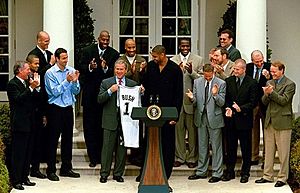
In the 2002–03 season, the Spurs moved to a new arena. Duncan continued his amazing play, averaging 23.3 points, a career-high 12.9 rebounds, 3.9 assists, and 2.9 blocks per game. He won his second NBA Most Valuable Player Award. David Robinson announced this would be his last season. The Spurs had the best record in the Western Conference.
In the playoffs, Duncan led the Spurs past the Lakers. They reached the Finals and defeated the New Jersey Nets to win another NBA championship. Duncan almost achieved a quadruple double (double digits in four stats) in the final game. He was named the NBA Finals MVP again. After this win, Robinson and Duncan were named Sports Illustrated's "Sportsmen of the Year."
Leading the Spurs Alone (2003–2007)
In 2003, Duncan signed a new contract with the Spurs. Before the 2003–04 season, David Robinson retired. Duncan became the sole leader of the team. The Spurs had new players like Tony Parker and Manu Ginóbili. Duncan continued to play strongly, leading the Spurs to the Western Conference Semifinals. They faced the Lakers again. In a very close Game 5, Duncan made a shot to put the Spurs ahead with less than a second left. But a Lakers player made a shot at the buzzer, and the Spurs lost the game and the series.
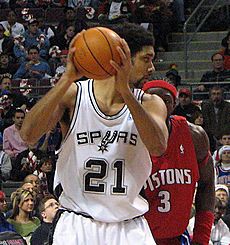
Duncan and the Spurs aimed to win big in the next season. Duncan's stats were a little lower, but the Spurs still won 59 games. In the 2005 NBA playoffs, they beat the Denver Nuggets and Seattle SuperSonics. Then they faced the fast-paced Phoenix Suns and beat them 4–1. This led them to the 2005 NBA Finals against the Detroit Pistons.
In the Finals, Duncan played against the strong defense of Ben Wallace. The Spurs won the first two games easily. But the Pistons focused their defense on Duncan, making it harder for him to score. The series went to a Game 7. Duncan was key in Game 7, scoring 25 points and grabbing 11 rebounds as the Spurs won the championship. NBA.com said Duncan "depleted and dissected the Pistons." Coach Popovich said Duncan's "complete game is so sound, so fundamental." Duncan won his third NBA Finals MVP Award, joining legends like Michael Jordan and Shaquille O'Neal.
During the 2005–06 season, Duncan had a foot injury for most of the year. This affected his performance, and he didn't make the All-NBA First Team for the first time in eight years. He played strongly in the 2006 NBA playoffs against the Dallas Mavericks. However, in Game 7, despite scoring 39 points, Duncan struggled in overtime, and the Spurs lost.
The next season was another championship year for Duncan and the Spurs. Duncan averaged 20.0 points, 10.6 rebounds, 3.4 assists, and 2.4 blocks. He was chosen as an All-Star for the ninth time. In the playoffs, he led the Spurs to wins over the Denver Nuggets, Phoenix Suns, and Utah Jazz. This set up a meeting with the Cleveland Cavaliers in the Finals. The Spurs swept the Cavaliers 4–0, winning Duncan his fourth championship. Duncan said this championship was "the best." Coach Popovich praised Duncan's leadership, saying he was "the common denominator." NBA commissioner David Stern called Duncan "a player for the ages."
Playoff Challenges (2007–2013)
In the 2007–08 season, Duncan continued to put up strong numbers. The Spurs finished with a good record and faced the Phoenix Suns in the first round of the 2008 NBA playoffs. Duncan started with a 40-point game, and the Spurs won the series. In the next round, they faced the New Orleans Hornets. The Spurs struggled at first but came back to win the series in Game 7. However, their rivals, the Los Angeles Lakers, defeated San Antonio in the Conference Finals. The Spurs again failed to win back-to-back championships.
Duncan started the 2008–09 season well, but his performance dropped due to a chronic knee problem. Even with Duncan's knee issues and teammate Ginóbili missing most of the season, San Antonio made the playoffs. However, the Spurs were eliminated in the first round by Dallas, which was their earliest playoff exit since 2000.
For the 2009–10 season, the Spurs added new players to help the team. Duncan continued to be a consistent threat, often getting a double-double (double digits in points and rebounds). He was named a starter for the 2010 NBA All-Star Game. The Spurs made the playoffs again and beat Dallas in the first round. But they lost to Phoenix in the next round.
Eleven games into the 2010–11 season, Duncan became the Spurs' all-time leader in points scored and games played. The Spurs had a great start to the season, winning 12 games in a row. On November 30, 2010, Duncan recorded his third career triple-double (double digits in three stats, like points, rebounds, and assists). A few days later, he played his 1,000th NBA game. The Spurs finished the regular season as the top team in the West. However, they were surprisingly upset in the first round of the 2011 NBA playoffs by the Memphis Grizzlies.
The Spurs again finished the 2011–12 season as the number one team in the West. Coach Popovich even jokingly listed Duncan as "DNP-OLD" (Did Not Play - Old) for one game, making fun of his age. Duncan's performance remained strong. The trio of Duncan, Parker, and Ginóbili entered the 2012 NBA playoffs well-rested. They swept their first two opponents. On May 31, 2012, Duncan set the record for most career blocks in playoff history. However, the Spurs' playoff run ended when they lost to the Oklahoma City Thunder.
On July 11, 2012, Duncan re-signed with the Spurs. With a strong group of younger players, Duncan and the Spurs made the playoffs again. Duncan returned to the All-Star team and was named to the All-NBA First Team. He also broke George Gervin's record for most points scored in a Spurs uniform. In the playoffs, the Spurs swept the Los Angeles Lakers and Memphis Grizzlies to reach the NBA Finals. Duncan recorded his 500th playoff block, becoming the first player in NBA history to reach that milestone. The Spurs faced the defending champions, the Miami Heat, in a very close series. Duncan played incredibly well in Game 6, but the Spurs lost in overtime and then lost the deciding Game 7.
Fifth Championship Win (2013–2014)
On December 2, 2013, Duncan became the oldest player in NBA history to record a "20-20 game" (20 points and 20 rebounds). He also made the game-winning shot against the Atlanta Hawks. The Spurs finished the 2013–14 regular season with the best record in the league.
In the playoffs, the Spurs defeated Dallas, Portland, and Oklahoma City. This set up a rematch against the Miami Heat in the Finals. The Spurs won the series 4–1, playing incredibly well in Games 3 and 4. The trio of Duncan, Ginóbili, and Parker broke the record for most wins together in NBA playoff history. After winning the Finals, Duncan joined John Salley as the only players to win a championship in three different decades.
Later Career and Retirement (2014–2016)
On November 14, 2014, Duncan scored his 25,000th point, becoming the 19th player in NBA history to reach that milestone. He continued to climb the NBA's all-time lists for scoring, rebounding, and blocks. On November 14, 2015, he had five blocked shots to become the Spurs' all-time leader in blocks, passing David Robinson. He also moved into fifth place all-time on the NBA's blocks list.
After missing some games due to rest and knee soreness, Duncan returned in January 2016. In that game, he was held scoreless for the first time in his 19-year career, ending a streak of 1,359 games with at least one point. On February 27, he became the fifth player in NBA history to reach 3,000 blocks. On March 10, Duncan became the sixth player in league history with 15,000 rebounds. On April 5, he became the third player with 1,000 regular season victories. The Spurs had a franchise-best record that season. However, they lost to the Oklahoma City Thunder in the second round of the playoffs.
On July 11, 2016, Tim Duncan announced his retirement from the NBA after 19 seasons with San Antonio. In September 2016, Coach Popovich said Duncan would have a coaching role with the team. On December 18, 2016, the Spurs retired Duncan's No. 21 jersey in a special ceremony. This means no other Spurs player will ever wear that number.
Playing for the National Team
In 1998, Duncan was chosen for the U.S. national team. However, due to an NBA player lockout, the team was replaced. Duncan's first chance to play for the national team came in 1999 for the Olympic Qualifying Team. He played well and helped the team win all their games, earning a spot in the 2000 Sydney Olympics. But a knee injury kept him from playing in the Olympics.
In 2003, Duncan was part of the USA team that won ten games and qualified for the 2004 Summer Olympics. He started every game and led the team in points, rebounds, and blocks. At the Olympics, the team lost three games and won a bronze medal. This was the first time since NBA players joined that the U.S. men's basketball team lost a game in international competition and didn't win gold. After the tournament, Duncan was disappointed and said he was "95 percent sure" his international career was over. Overall, Duncan played for five USA Basketball teams in 40 games.
Player Style and Personality
Duncan was 6 feet 11 inches tall and weighed 250 pounds. He played as a power forward and could also play center. He was known for consistently getting a double-double (double digits in points and rebounds) throughout his career. He was one of the best defenders close to the basket and was always among the top scorers, rebounders, and shot-blockers. By the end of his career, he led active players in regular season and playoff double-doubles. His main weakness was his free throw shooting, which was usually below 70%.
Duncan was also known as a "clutch player," meaning he performed well in important moments. This is shown by his three NBA Finals MVP awards. Eleven-time NBA champion Bill Russell praised Duncan's passing skills. Many basketball experts consider Duncan the greatest power forward in NBA history. Coach Popovich and his teammates Parker and Ginóbili also said Duncan was a huge reason for the Spurs' success.
Some people called Duncan "boring" because his playing style was simple but very effective. This is why he was nicknamed "The Big Fundamental." After his first championship in 1999, Sports Illustrated called him a "quiet, boring MVP."
Duncan explained his "boring" image by saying, "If you show excitement, then you also may show disappointment or frustration. If your opponent picks up on this frustration, you are at a disadvantage." Sports journalist Kevin Kernan said Duncan's psychology degree helped him stay calm and focused. Shaquille O'Neal also praised Duncan's calm behavior on the court. O'Neal wrote in his book that he could talk trash to other players, but Duncan would just look at him "like he was bored."
Duncan has said he especially likes his bank shot, calling it "easy for me." His long and close relationship with Spurs coach Gregg Popovich has been called "the greatest love story in sports."
Awards and Honors
During his basketball career, Duncan received many awards.
NBA Awards
- 5× NBA champion: 1999, 2003, 2005, 2007, 2014
- 3× NBA Finals MVP: 1999, 2003, 2005
- 2× NBA Most Valuable Player: 2002, 2003
- 15× NBA All-Star: 1998, 2000–2011, 2013, 2015
- 2000 NBA All-Star Game co-MVP
- 10× All-NBA First Team
- 3× All-NBA Second Team
- 2× All-NBA Third Team
- 8× NBA All-Defensive First Team
- 7× NBA All-Defensive Second Team
- 1998 NBA Rookie of the Year
- 1998 NBA All-Rookie First Team
- 2015 Twyman–Stokes Teammate of the Year
- NBA 75th Anniversary Team
- No. 21 Retired by San Antonio Spurs
U.S. National Team Awards
- 2003 USA Basketball Male Athlete of the Year
- 1994 Goodwill Games Bronze Medal
- 1995 Summer Universiade Gold Medal
- 1999 FIBA Americas Championship Gold Medal
- 2003 FIBA Americas Championship Gold Medal
- 2004 Summer Olympics Bronze Medal
College Awards
- 1995 ACC Regular Season Champions
- 2× ACC Tournament Champions: 1995, 1996
- 1997 Consensus National College Player of the Year
- 2× Consensus First-Team All-American: 1996, 1997
- 1997 Chip Hilton Player of the Year
- 3× NABC Defensive Player of the Year: 1995–1997
- 1997 NCAA Rebounding leader
- 1997 ACC Athlete of the Year
- 2× ACC Player of the Year: 1996, 1997
- 3× First-Team All-ACC: 1995–1997
- No. 21 Retired by Wake Forest Demon Deacons
- Wake Forest Sports Hall of Fame – Class of 2009
Halls of Fame
- Naismith Memorial Basketball Hall of Fame – Class of 2020
- National Collegiate Basketball Hall of Fame – Class of 2017
Coaching Career
On July 22, 2019, the San Antonio Spurs announced that Duncan was named an assistant coach. He was the acting head coach for one game on March 3, 2020, leading the Spurs to a comeback win. Coach Popovich was away for personal reasons.
On November 12, 2020, Duncan decided to step down as an assistant coach for the Spurs.
Career Statistics
NBA Regular Season Stats
| Year | Team | GP | GS | MPG | FG% | 3P% | FT% | RPG | APG | SPG | BPG | PPG |
|---|---|---|---|---|---|---|---|---|---|---|---|---|
| 1997–98 | San Antonio | 82* | 82* | 39.1 | .549 | .000 | .662 | 11.9 | 2.7 | .7 | 2.5 | 21.1 |
| 1998–99† | San Antonio | 50* | 50* | 39.3 | .495 | .143 | .690 | 11.4 | 2.4 | .9 | 2.5 | 21.7 |
| 1999–00 | San Antonio | 74 | 74 | 38.9 | .490 | .091 | .761 | 12.4 | 3.2 | .9 | 2.2 | 23.2 |
| 2000–01 | San Antonio | 82 | 82* | 38.7 | .499 | .259 | .618 | 12.2 | 3.0 | .9 | 2.3 | 22.2 |
| 2001–02 | San Antonio | 82 | 82 | 40.6 | .508 | .100 | .799 | 12.7 | 3.7 | .7 | 2.5 | 25.5 |
| 2002–03† | San Antonio | 81 | 81 | 39.3 | .513 | .273 | .710 | 12.9 | 3.9 | .7 | 2.9 | 23.3 |
| 2003–04 | San Antonio | 69 | 68 | 36.6 | .501 | .167 | .599 | 12.4 | 3.1 | .9 | 2.7 | 22.3 |
| 2004–05† | San Antonio | 66 | 66 | 33.4 | .496 | .333 | .670 | 11.1 | 2.7 | .7 | 2.6 | 20.3 |
| 2005–06 | San Antonio | 80 | 80 | 34.8 | .484 | .400 | .629 | 11.0 | 3.2 | .9 | 2.0 | 18.6 |
| 2006–07† | San Antonio | 80 | 80 | 34.1 | .546 | .111 | .637 | 10.6 | 3.4 | .8 | 2.4 | 20.0 |
| 2007–08 | San Antonio | 78 | 78 | 34.0 | .497 | .000 | .730 | 11.3 | 2.8 | .7 | 1.9 | 19.3 |
| 2008–09 | San Antonio | 75 | 75 | 33.6 | .504 | .000 | .692 | 10.7 | 3.5 | .5 | 1.7 | 19.3 |
| 2009–10 | San Antonio | 78 | 77 | 31.3 | .519 | .182 | .725 | 10.1 | 3.2 | .6 | 1.5 | 17.9 |
| 2010–11 | San Antonio | 76 | 76 | 28.3 | .500 | .000 | .716 | 8.9 | 2.7 | .7 | 1.9 | 13.4 |
| 2011–12 | San Antonio | 58 | 58 | 28.2 | .492 | .000 | .695 | 9.0 | 2.3 | .7 | 1.5 | 15.4 |
| 2012–13 | San Antonio | 69 | 69 | 30.1 | .502 | .286 | .817 | 9.9 | 2.7 | .7 | 2.7 | 17.8 |
| 2013–14† | San Antonio | 74 | 74 | 29.2 | .490 | .000 | .731 | 9.7 | 3.0 | .6 | 1.9 | 15.1 |
| 2014–15 | San Antonio | 77 | 77 | 28.9 | .512 | .286 | .740 | 9.1 | 3.0 | .8 | 2.0 | 13.9 |
| 2015–16 | San Antonio | 61 | 60 | 25.2 | .488 | .000 | .702 | 7.3 | 2.7 | .8 | 1.3 | 8.6 |
| Career | 1,392 | 1,389 | 34.0 | .506 | .179 | .696 | 10.8 | 3.0 | .7 | 2.2 | 19.0 | |
| All-Star | 15 | 12 | 20.7 | .548 | .250 | .765 | 9.1 | 2.1 | .9 | .5 | 9.3 | |
NBA Playoff Stats
| Year | Team | GP | GS | MPG | FG% | 3P% | FT% | RPG | APG | SPG | BPG | PPG |
|---|---|---|---|---|---|---|---|---|---|---|---|---|
| 1998 | San Antonio | 9 | 9 | 41.6 | .521 | .000 | .667 | 9.0 | 1.9 | .6 | 2.6 | 20.7 |
| 1999† | San Antonio | 17 | 17 | 43.1 | .511 | .000 | .748 | 11.5 | 2.8 | .8 | 2.6 | 23.2 |
| 2001 | San Antonio | 13 | 13 | 40.5 | .488 | 1.000 | .639 | 14.5 | 3.8 | 1.1 | 2.7 | 24.4 |
| 2002 | San Antonio | 9 | 9 | 42.2 | .453 | .333 | .822 | 14.4 | 5.0 | .7 | 4.3 | 27.6 |
| 2003† | San Antonio | 24 | 24 | 42.5 | .529 | .000 | .677 | 15.4 | 5.3 | .6 | 3.3 | 24.7 |
| 2004 | San Antonio | 10 | 10 | 40.5 | .522 | .000 | .632 | 11.3 | 3.2 | .8 | 2.0 | 22.1 |
| 2005† | San Antonio | 23 | 23 | 37.8 | .464 | .200 | .717 | 12.4 | 2.7 | .3 | 2.3 | 23.6 |
| 2006 | San Antonio | 13 | 13 | 37.9 | .573 | .000 | .718 | 10.5 | 3.3 | .8 | 1.9 | 25.8 |
| 2007† | San Antonio | 20 | 20 | 36.8 | .521 | — | .644 | 11.5 | 3.3 | .7 | 3.1 | 22.2 |
| 2008 | San Antonio | 17 | 17 | 39.2 | .449 | .200 | .626 | 14.5 | 3.3 | .9 | 2.1 | 20.2 |
| 2009 | San Antonio | 5 | 5 | 32.8 | .532 | — | .607 | 8.0 | 3.2 | .6 | 1.2 | 19.8 |
| 2010 | San Antonio | 10 | 10 | 37.3 | .520 | .500 | .478 | 9.9 | 2.6 | .8 | 1.7 | 19.0 |
| 2011 | San Antonio | 6 | 6 | 35.3 | .478 | — | .625 | 10.5 | 2.7 | .5 | 2.5 | 12.7 |
| 2012 | San Antonio | 14 | 14 | 33.1 | .495 | .000 | .707 | 9.4 | 2.8 | .7 | 2.1 | 17.4 |
| 2013 | San Antonio | 21 | 21 | 35.0 | .470 | .000 | .806 | 10.2 | 1.9 | .9 | 1.6 | 18.1 |
| 2014† | San Antonio | 23 | 23 | 32.7 | .523 | .000 | .760 | 9.1 | 1.9 | .3 | 1.3 | 16.3 |
| 2015 | San Antonio | 7 | 7 | 35.7 | .589 | .000 | .559 | 11.1 | 3.3 | 1.3 | 1.4 | 17.9 |
| 2016 | San Antonio | 10 | 10 | 21.8 | .423 | — | .714 | 4.8 | 1.4 | .2 | 1.3 | 5.9 |
| Career | 251 | 251 | 37.3 | .501 | .143 | .689 | 11.4 | 3.0 | .7 | 2.3 | 20.6 | |
College Stats
| Year | Team | GP | GS | MPG | FG% | 3P% | FT% | RPG | APG | SPG | BPG | PPG |
|---|---|---|---|---|---|---|---|---|---|---|---|---|
| 1993–94 | Wake Forest | 33 | 32 | 30.2 | .545 | 1.000 | .745 | 9.6 | .9 | .4 | 3.8 | 9.8 |
| 1994–95 | Wake Forest | 32 | 32 | 36.5 | .591 | .429 | .742 | 12.5 | 2.1 | .4 | 4.2 | 16.8 |
| 1995–96 | Wake Forest | 32 | 32 | 37.2 | .555 | .304 | .687 | 12.3 | 2.9 | .7 | 3.8 | 19.1 |
| 1996–97 | Wake Forest | 31 | 31 | 36.7 | .608 | .273 | .636 | 14.7 | 3.2 | .7 | 3.3 | 20.8 |
| Career | 128 | 127 | 35.1 | .577 | .321 | .689 | 12.3 | 2.3 | .5 | 3.8 | 16.5 | |
Personal Life
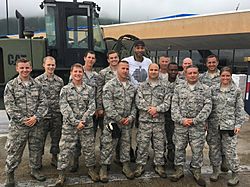
Duncan married and had two children. Later, he and his girlfriend welcomed their first child in 2017.
In 2001, Duncan started the Tim Duncan Foundation. This foundation helps fund programs for health, education, and youth sports in San Antonio, Winston-Salem, and the U.S. Virgin Islands. The foundation has held events like bowling and golf tournaments to raise money. Between 2001 and 2002, the foundation raised over $350,000 for health research. Duncan has also supported centers for children dealing with loss and cancer. In August 2017, his foundation helped organize supplies for victims of Hurricane Harvey.
Duncan says his late mother was his biggest inspiration. She taught him a nursery rhyme: "Good, Better, Best. Never let it rest/Until your Good is Better, and your Better is your Best." He made this his personal motto. He believes dedication, teamwork, and friendship are the most important values. He chose jersey number 21 because it was his brother-in-law's college number, who inspired him to play basketball. Duncan also looked up to Los Angeles Lakers point guard Magic Johnson when he was a child.
Duncan received the Virgin Islands Medal of Honor, the highest award from his home territory. He has also been celebrated with "Tim Duncan Day" ceremonies. In 2000, a local leader said, "He is a quiet giant. His laid-back attitude is the embodiment of the people of St. Croix, doing things without fanfare and hoopla."
Duncan enjoys Renaissance fairs and the fantasy role-playing game Dungeons & Dragons.
In March 2020, Duncan offered to pay for airline tickets for college students from the U.S. Virgin Islands to travel home during the COVID-19 pandemic.
Images for kids
-
Duncan (No. 21) attempting to block Kobe Bryant's shot in a game against the Los Angeles Lakers at the Staples Center
See also
 In Spanish: Tim Duncan para niños
In Spanish: Tim Duncan para niños
 | Sharif Bey |
 | Hale Woodruff |
 | Richmond Barthé |
 | Purvis Young |


